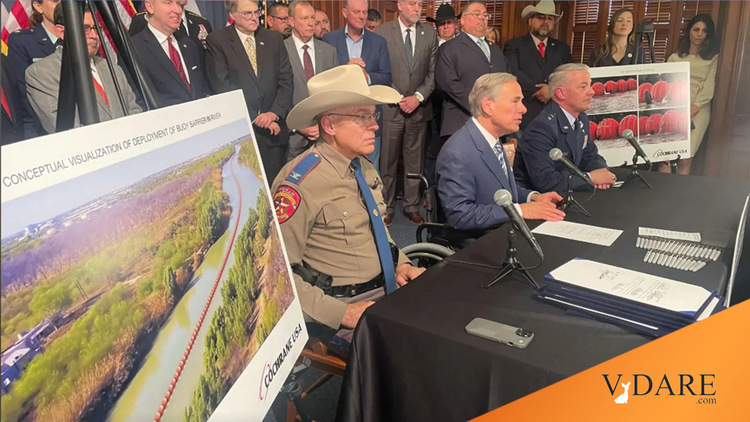Earlier: Doctors Support BLM by Ditching White for Black Coats
In recent decades, medical science has discovered a certain number of situations in which the race of the patient is relevant to how doctors should interpret test results and the like, findings that usually benefit people of sub-Saharan descent the most. But the Race Does Not Exist creed hasn’t meant that a lot of Sociology of Medicine types have been trying to get doctors to ignore this knowledge and therefore misdiagnose more blacks in the name of fighting racist hate. Or something.
In the New England Journal of Medicine, some black doctors try to halt this stupid and life-threatening ideological fad. But look at all the hoops they have to jump through to make their simple point:
Embracing Genetic Diversity to Improve Black Health
Akinyemi Oni-Orisan, Pharm.D., Ph.D., Yusuph Mavura, M.S., Yambazi Banda, Ph.D., Timothy A. Thornton, Ph.D., and Ronnie Sebro, M.D., Ph.D.
As researchers whose work is largely focused on genetics and who self-identify as Black men, arguably one of the most disadvantaged groups in the United States, we have had similar formative experiences during our training and careers. We have all dealt with aggressions and microaggressions, isolation, imposter syndrome, the Pygmalion effect or stereotype threat, gaslighting, and a lack of mentorship, especially Black mentorship. We have made our way in a field that has an alarming dearth of leaders and research participants of African descent — a common story among Black professionals in science, technology, engineering, and mathematics (STEM) fields.
Despite these similarities, the five of us are also a diverse group, with representation from academia and industry and from career stages ranging from doctoral student to tenured full professor. We work in different subspecialties within genetics: pharmacogenomics, statistical genetics, genetic epidemiology, and population genetics. Some of us are clinicians (pharmacists and physicians), and the academics among us have appointments in different schools (pharmacy, medicine, and public health) within our respective universities. We are also diverse in terms of our Black identities; we self-identify as first-generation Nigerian American (Yoruba ethnicity), first-generation American of Tanzanian descent (Pare and Nyamwezi ethnicities), Zambian (Ngoni ethnicity), African American, and Tobagonian (West Indian). But our personal experiences as Black male geneticists in science and society have given us a certain perspective on genetics, race, ancestry, and health disparities affecting the Black community.
Genetic Diversity as a Component of Race
The genetics of racial classifications has been discussed for centuries,2 with general positions falling into two broad categories: either the use of race in clinical practice and biomedical research has substantial benefits3 or race has no biologic basis and thus no place in medicine.4 This long-standing debate has involved epidemiologists, geneticists, clinicians, and social scientists.The debate has recently resurfaced (in the evaluation of race’s use in clinical algorithms5 and the implementation of antiracism curricula6), largely in response to two key events that have brought increased attention to health disparities negatively affecting Black communities. The first is the Covid-19 pandemic, in which higher Covid-19 mortality has been observed among Black Americans than among White Americans, with evidence suggesting that racial differences in rates of coexisting conditions at least partially account for these disparities.7 The second is the death of George Floyd, which has sparked global protests against anti-Black racism.
It has been demonstrated8 and more recently confirmed9 that a small but appreciable proportion of the genetic differences between any two people (about 15%) reflect divergence between, rather than diversity within, groups defined according to continent of ancestral origin. There is a remarkably strong correlation between a person’s continent of ancestral origin and self-identified race.10 Thus, we believe that race has both a genetic and a social component. …
Genetic differences between populations defined by ancestry may contribute to clinically significant health disparities. For example, the Clarification of Oral Anticoagulation through Genetics (COAG) trial showed a disparity in outcomes of pharmacogenomic-guided warfarin dosing between populations of European and African ancestry.
Warfarin is serious stuff and you really want to use all the knowledge available regarding its use.
[Comment at Unz.com]… Ultimately, considering these and numerous other examples, we understand that genetic differences exist between people belonging to different socially constructed racial categories. We embrace this diversity and acknowledge its clinically meaningful implications. These differences can allow researchers to make important advances in health and science, and this recognition is what compels us to do the work we do.
We do not believe that ignoring race will reduce health disparities; such an approach is a form of naive “color blindness” that is more likely to perpetuate and potentially exacerbate disparities. Although ignoring race could improve equality (by leading to identical medical treatment for everyone), we believe that equity is necessary to address disparities. We urge our colleagues in medicine and science to refrain from haphazardly removing race from clinical algorithms and treatment guidelines in response to recent initiatives attempting to combat anti-Black racism. The ultimate goal, we believe, would be to replace race with genetic ancestry in an evidence-based manner. But we have not yet reached a point where genetic-ancestry data are readily available in routine care or where clinicians know what to do with these data. Until we do, ignoring race and thereby reverting to the United States’ outdated system of health care, in which clinical research findings are generated in populations of European descent and extrapolated to the treatment of non-European populations, is neither equitable nor safe for those other populations. …










